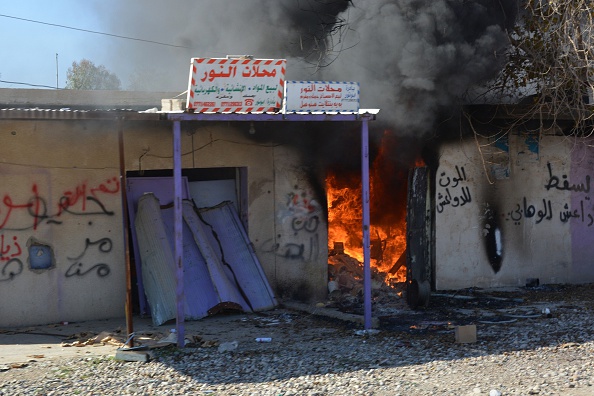
Body counts are never a good a yardstick for measuring progress in a war of ideas. That’s why the Pentagon freaked out Thursday when Stuart Jones, the U.S. ambassador to Iraq, told the Al Arabiya News Channel that America and its allies “have now killed more than 6,000 ISIS fighters in Syria and Iraq.”
The first counter-fire came, within hours, from Defense Secretary Chuck Hagel. “I was in a war where there was a lot of body counts every day,” the outgoing defense chief, who served as an Army sergeant in the Vietnam War, said in one of his most pungent observations in his two years on the job. “And we lost that war.”
Hagel’s spokesman piled on Friday. “It’s not a metric that we’re going to hang our hat on when it comes to talking to the success of this strategy,” Rear Admiral John Kirby said of the Pentagon’s internal body-count estimate. “This is not a uniformed army with identification cards and recruiting posters.”
While Ambassador Jones added that the 6,000 number was “not so important” in the overall scheme of things, the catnip was out of the bag. That’s because Americans, impatient over wars that drag on (like Hagel’s Vietnam and George W. Bush’s Afghanistan and Iraq), crave measurements that suggest progress.
Unfortunately, that metric mindset has little utility in wars against ideology. “I don’t know whether 6,000 [ISIS] people have been killed or not,” California Sen. Dianne Feinstein, the ranking Democrat on the intelligence committee, told CBS’s Face the Nation on Sunday. “But that is not going to do it.”
That’s because conflicts like the one now underway against the Islamist fundamentalism represented by the Islamic State in Iraq and Greater Syria (ISIS) are not constrained by national boundaries, or the national pressure points that have traditionally been the trigger of wars (and the foundation of ending them) among states.
Without the trappings of formal government—a capital, commerce, standing armies—non-state actors like ISIS or al-Qaeda deny military powers like the U.S. the kinds of targets they prefer. Their allegiance to ideology—be it theology or something else—takes away the fulcrum that victors used to leverage to bring wars to an end.
Industrial powers created industrial militaries, where rear-echelon bean-counters could tote up tanks, ball-bearing factories and troops destroyed—and thereby chart progress, or the lack thereof. But ideological war isn’t industrial in scope. Instead, it’s more like information warfare, where ideas, shared online, create alliances that ripple across borders and oceans.
It took a Detroit to build an industrial arsenal of democracy, with each weapon requiring dollars and sweat to assemble. Today, it merely takes a keyboard to build an ideological alliance, each member a low-cost addition requiring little more than fervor and an Internet connection.
The Administration of George W. Bush concluded the way to prevail after the 9/11 attacks was to invade and occupy Afghanistan and Iraq. Following wars that eventually will cost $3 trillion or more, and at least 6,845 American lives, his successor has decided not to tag along. Instead, President Barack Obama has told the nations involved—those with the most at risk—to step up to the plate to do the fighting, with the U.S. filling the role of best supporting actor.
Some see such a policy as too timid. “The U.S. efforts have always been halfhearted, half-resourced and focused on exit strategies rather than on success,” says David Sedney, who ran the Pentagon office responsible for Afghanistan, Pakistan and central Asia from 2009 to 2013. “We always want to have an exit, and the problem with real life is there’s no exit.” He argues that the U.S. needs to launch nation-building strategies in failed states that currently serve as incubators for ISIS and other groups.
Politicians aren’t calling for such radical action. But some believe the U.S. needs to step up the fight. “We need more boots on the ground,” Arizona Republican Sen. John McCain, the new chairman of the Armed Services Committee, told CBS on Sunday. “I know that is a tough thing to say and a tough thing for Americans to swallow, but it doesn’t mean the 82nd Airborne. It means forward air controllers. It means special forces. It means intelligence and it means other capabilities.”
The U.S., McCain said, can’t simply direct wars against ISIS and similar foes from relative safety behind the front lines. “For [the Administration] to say, ‘we expect [Iraq and Yemen] to do it on their own,’ they’re not doing it on their own,” he said. “And they are losing.”
The last clear victory scored by the U.S. military was against Iraq in 1991, led by President George H.W. Bush, a Cold War commander-in-chief. It was a bespoke war tailor-made for the Pentagon: Iraq’s massive army stormed into Kuwait, occupied it, and waited for the U.S. and its allies to drive it out.
The world watched that conflict and decided, given Washington’s overwhelming advantages in that kind of war, not to fight it again. Unfortunately, too many Americans seem unaware that the rules have changed. So they continue to want to measure progress in today’s conflicts with yesterday’s yardsticks.
But such yearnings are doomed. Persistence and will, not body bags, are the keys to winning these kinds of wars.
More Must-Reads from TIME
- Donald Trump Is TIME's 2024 Person of the Year
- Why We Chose Trump as Person of the Year
- Is Intermittent Fasting Good or Bad for You?
- The 100 Must-Read Books of 2024
- The 20 Best Christmas TV Episodes
- Column: If Optimism Feels Ridiculous Now, Try Hope
- The Future of Climate Action Is Trade Policy
- Merle Bombardieri Is Helping People Make the Baby Decision
Contact us at letters@time.com